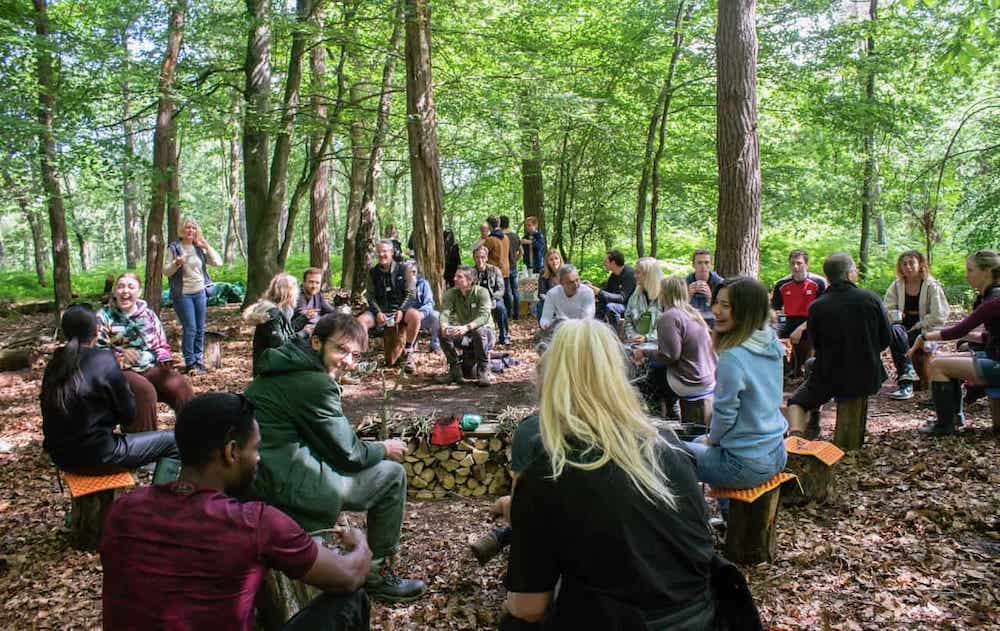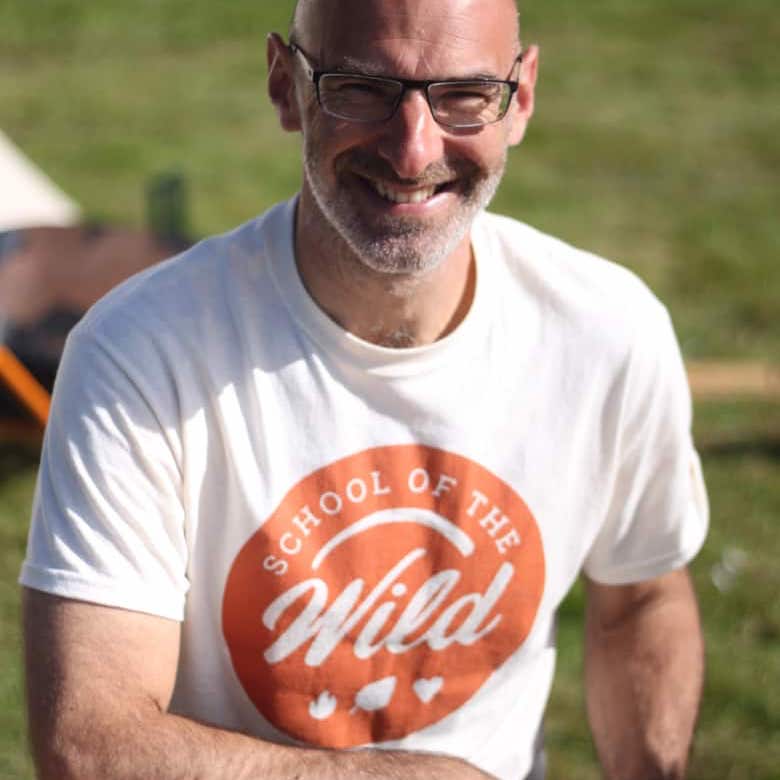|
Scavenger hunts, paintballing, and escape rooms can be fun but do they really help to build your team or do they just reinforce behaviours and divisions? Here's why you need to get your team outside into nature instead.
photo: PlusX at a School of the Wild team day. Courtesy PlusX.
What did your last team-building day look like?
Perhaps it was a day of all-out fun and activities: paintballing, go-karting or scavenger hunting. These kinds of team-building days can be a fantastic way to get out of the office and allow team members to get to know each other in a relaxed environment. Or maybe it was a more sedate, work-focussed day, held at a hotel or conference venue, where your team could learn, strategise and think together. This kind of day can be really useful as a way to kickstart new plans and re-evaluate old ones, away from email distractions. But there’s a big problem with both of these kinds of traditional team-building: neither does much to actually build a team. They can feel as if they do, but the real, deep work of growing together rarely happens. Traditional team-building doesn’t build teams
Taking your team out for a day of paintballing is undoubtedly fun. But it’s also naturally competitive: the opposite of team-building.
This kind of day is all about working to beat other groups, and while it’s lighthearted and very different from the work you do in the office, it might not do as much as you’d expect to help your team work better together when you’re back in the office. At its best, it’s an enjoyable day out and a break from the desk. At worst? Competitive team-building days can become a fractious experience that simply serves to reinforce office divisions, rather than mending them. And you might not even realise what’s happening, as staff are likely to feel that they need to be positive about the day and be seen to have fun, even if they’re introverts who’d rather be doing almost anything else. Deliberately setting out to create competition in your team (even if only for a day), isn’t team-building, nor is it likely to do anything to help you meet the challenges your organisation faces. That’s especially true now, post-pandemic, when most of us have been working at home for over a year and many of us will continue to do so for some time yet, at least part-time. That’s not to say you shouldn’t take your team paintballing if it’s something you know you’ll all enjoy (though think carefully about whether that’s really the case for quieter people), but it’s probably not going to help you build your team. And what of the more businesslike, strategy-focussed team-building days? They don’t necessarily create competition, but they don’t help people step out of their comfortable office roles and work collaboratively. You might mix people up and ask them to work in ways they wouldn’t usually work in, but any time you’re sitting around tables, indoors, talking about business, it’s difficult to feel that you’re in anything other than just another meeting. It can also be tricky to prevent the people who usually dominate office meetings from dominating the day, meaning others feel unheard and overlooked. Given all that, it’s perhaps not surprising that many employees dread team-building days and don’t see the value of them. And if your people don’t come back from a team-building day feeling more connected and able to work better together? Then it’s not teambuilding. Competitive team-building days can become a fractious experience that simply serves to reinforce office divisions, rather than mending them. What do you really want from a team building day?
You’re busy. Your to-do lists are long and ever-growing. A team-building day often feels like an unnecessary distraction for attendees, and another box to tick for organisers. It’s rare that team-building is really valued as a vital part of organisational strategy, or seen as something that can genuinely increase trust and collaboration.
Even according to research by TeamSport, who run team-building go-karting days, only 18% of people believe that spending time outside work with other employees helps them bond, and only 11% said it helps them become more confident in their role. That’s not necessarily because people don’t like each other, but because they don’t know how to collaborate effectively. For teambuilding to work, it needs to focus, thoughtfully, on how to increase collaboration and trust. A day of go-karting simply can’t achieve that. So if you are to think differently about team-building, what should it look like? If you want your next team-building day to do more than tick a box, you want it to:
Team-building in nature
So if scavenger hunts and paintballing are out, what should you do for your next team-building day? Take it into nature.
70% of people in Europe live in urban areas, disconnected from nature...but we still have a fundamental need to connect with the land, trees and sky. Humans have existed for five million years, but we’ve only been living in cities for the last 200. It’s not surprising, then, that we still crave nature, and that many of us will head straight for the coast or the hills whenever we have the time. From a team building point of view, Spending time in nature is known to help create greater community cohesion, even after we leave it and return to our urban homes and offices. The team-building days we run in nature are focused on trust and collaboration. They’re about giving people the space they need to re-engage with each other, without being separated by office doors,laptop screens and hierarchical organisational charts. The woods are a safe, neutral space where everyone can feel free to be themselves and talk, far away from email and Slack notifications and workplace barriers – real or imagined. And yes, there are activities, but they’re naturally collaborative, rather than competitive: foraging, fire-making or shelter building. Our nomadic ancestors didn’t compete within their tribe to see who could build the best shelter or the brightest fire. They worked together to make sure everyone was warm and dry, because they knew that unless the whole village was safe and warm, no-one was safe and warm. As an African proverb says “if you want to go fast go alone, if you want to go further go together". Working together purposefully, on a meaningful practical task, allows you to develop a deep level of understanding and trust. You can use that understanding to develop practical solutions to the difficult, and often messy, challenges that inevitably occur in fast-moving environments and hierarchical organisations The result? Teams that know how to collaborate, share ideas, talk and trust each other – the true foundation of a high-performing team. Here's what people say: "Everyone was relaxed, opened up, had a good time, and made brilliant connections- and left wanting to do it again!!! So pleased. What you do is so brilliant and unique." Liz Holland, Associate Director of People Participation, Sussex Partnership NHS "As I am sure you could tell, the group left as we had hoped: energised, connected and inspired. Everyone has that extra sparkle today" Mat Hunter, Co-CEO, PlusX Want to find out how we could help your team work better together with a teamwork and collaboration day? Get in touch here. Comments are closed.
|
Author & CuratorNigel Berman is the founder of School of the Wild. Archives
March 2024
|
Leaders |
About Us
Support |
|



 RSS Feed
RSS Feed



